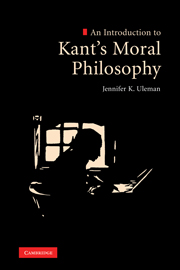Book contents
- Frontmatter
- Contents
- Acknowledgements
- 1 Introduction: the strange thing
- 2 A sketch of Kantian will: desire and the human subject
- 3 A sketch continued: the structure of practical reason
- 4 A sketch completed: freedom
- 5 Against nature: Kant's argumentative strategy
- 6 The categorical imperative: free will willing itself
- 7 What's so good about the good Kantian will? The appeals of the strange thing
- 8 Conclusion: Kant and the goodness of the good will
- Bibliography
- Index
6 - The categorical imperative: free will willing itself
Published online by Cambridge University Press: 05 June 2012
- Frontmatter
- Contents
- Acknowledgements
- 1 Introduction: the strange thing
- 2 A sketch of Kantian will: desire and the human subject
- 3 A sketch continued: the structure of practical reason
- 4 A sketch completed: freedom
- 5 Against nature: Kant's argumentative strategy
- 6 The categorical imperative: free will willing itself
- 7 What's so good about the good Kantian will? The appeals of the strange thing
- 8 Conclusion: Kant and the goodness of the good will
- Bibliography
- Index
Summary
This chapter aims to defend an alternative to a widespread formalist interpretation of Kant's moral theory. It does so via a close reading of Kant's canonical arguments for his moral law in the Groundwork of the Metaphysics of Morals and the Critique of Practical Reason. On the interpretation I defend here, Kant's famous categorical imperative urges the ‘free will to will itself.’ This is of course how Hegel put it. To put Kant's moral imperative this way is not, in my view, nor was it in itself for Hegel, a criticism of Kant, though Hegel of course did criticize Kant. Rather, it is to argue that Kant's moral law, expressed in the categorical imperative, has as its specific end the free rational activity of the will itself.
The first part of this chapter traces the roots of the formalist reading, and shows what Kant's formalism (really) demands, and what it doesn't. My aim is to loosen the grip of a formalist ban on asking what Kant cares about, or what his moral theory aims at, by showing that Kant didn't want to silence those inquiries. Having carved out permission to ask, directly, what Kant cares about, what he values, what his moral theory aims at, I turn to Kant's Groundwork of the Metaphysics of Morals and Critique of Practical Reason discussions of the moral law (the categorical imperative) and read them with these questions in mind.
- Type
- Chapter
- Information
- An Introduction to Kant's Moral Philosophy , pp. 111 - 144Publisher: Cambridge University PressPrint publication year: 2010



